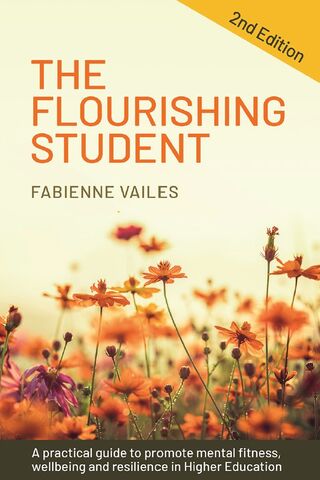Education
Mental Health Is at the Center of Higher Education Reform
A new book presents reforms for higher education that prioritize mental health.
Posted May 18, 2022 Reviewed by Davia Sills
Key points
- The median age of onset for psychotic disorders extends from the late teens through the early 20s, when many are in college and graduate school.
- Recommendations from reformers like Fabienne Vailes encourage universities to prioritize mental health.
- Institutions like the University of Gloucestershire have implemented the University Mental Health Charter to prioritize mental well-being.

As a clinician whose caseload is largely comprised of university students, faculty, and staff, I try to get a beat on current trends in higher education at an early stage. I was therefore intrigued to chat with educator and linguist Fabienne Vailes, who is on a quest to reform higher education with a focus on mental health. In her new book, The Flourishing Student: A Practical Guide to Promoting Mental Health, Well-being and Resilience in Higher Education, Vailes describes what she calls the Flourishing Model (FM) of education, which she hopes can serve as an inspiration to reform the education ecosystems that have been failing children due to their limited focus on mental health.
In her book, Vailes picks up where Sir Ken Robinson leaves off in his TED Talk on changing education paradigms, which implicates the industrial-era assembly line model of education as it minimizes students' individual needs. Ms. Vailes takes things a step further by emphasizing the importance of both mental health and student contributions to the curriculum of higher education. Vailes paraphrases Robert Kegan's developmental model, suggesting that to withstand the type of discomfort that education requires, especially in higher education, one needs to feel psychologically safe. In an effort to help students feel psychologically safe, Vailes hopes to inspire higher education institutions to consider, if not adopt, one of the reform models discussed in the book.
Different models of educational reform
The models that Vailes explores all utilize a systems approach, as outlined by systems theorist Peter Senge. This approach identifies students within their educational systems as holons—autonomous units within themselves that are also parts of a larger whole, like flowers in a garden or cells in the body—with each student being allowed to co-create the educational system of which they're a part. One such model discussed in The Flourishing Student is the University Mental Health Charter. Developed by Hughes and Spanner (2019), the Charter provides a set of evidence-informed principles that support a "whole university" approach to mental health and well-being.
The University of Gloucestershire (UoG) in the United Kingdom is on the cutting edge with regard to implementing the University Mental Health Charter, as it was one of the initial 41 universities to be part of the University Mental Health Charter Program in 2021-22. Leading the charge at the UoG are Vailes's collaborators: Professor Jenny Hill, Head of Learning and Teaching Innovation, and Anna Hay, Head of Student Well-Being.
According to Hill and Hay, the long-term goal of the UoG's reform efforts is a three-year program in which a team of students from diverse demographic and academic backgrounds is involved in a continuous process of curriculum design, delivery, assessment, and support for learning, with mental well-being at the core of each component.

At UoG, these efforts are supported by resources and workshops with the goal of increasing students' sense of belonging; bolstering resources for student mental health support; target training for staff on mental health and well-being; increasing access to physical health activities; and the development of other skills for transitioning out of university life.
In addition to the University Mental Health Charter, Vailes also discusses the Appreciative Inquiry (AI) model in her book. Developed by Dr. Michelle McQuaid and Dr. David Cooperrider, the AI model focuses on making the recipients of reform stakeholders in the reformation process. In a recent podcast interview, Dr. Peggy Kern of the University of Melbourne's Graduate School of Education says that applying AI to higher education reform requires faculty and staff to define "well-being" for each school and then prioritize recruiting and training with this definition in mind. In addition, students are brought into the process to give regular, qualitative feedback about how they experience their learning environment around the subject of well-being.
Prioritizing mental health in higher education is something Vailes and I both hold dear because we each believe that when it comes to the neurological, psychological, and social development of young adults, 25 is the new 18. As such, the ages that most students pursue their undergraduate and graduate studies lie before they have reached full neurological and psychological maturation. Given all of the changes and stressors associated with university life, this may be a primary reason why the median age of onset for psychotic disorders extends from the late teens through the early 20s (Kessler, et al., 2007). Therefore, we should take heed of the recommendations that Vailes and her colleagues make in The Flourishing Student so that the future of higher education can emerge from a soil enriched with the psychological well-being of its stakeholders.
References
Hughes, G. ‘Transition distress: The big problem facing universities’ in Human Givens Journal, 19, 42–44 (2012).
Hughes, G. and Spanner, L. The university mental health charter. Leeds: Student Minds (2019). https://universitymentalhealthcharter.org.uk/themes/
Kessler, R.C., Amminger, G.P., Aguilar‐Gaxiola, S., Alonso, J., Lee, S., & Ustun, T.B., (2007). Age of onset of mental disorders: A review of recent literature. Curr Opin Psychiatry, 20(4): 359–364.


